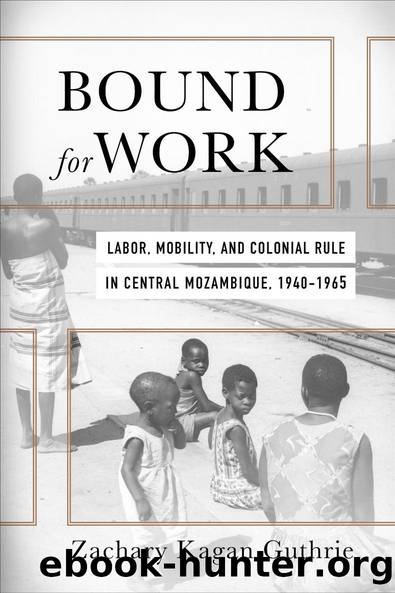Bound for Work by Zachary Kagan Guthrie

Author:Zachary Kagan Guthrie [Guthrie, Zachary Kagan]
Language: eng
Format: epub
Tags: Nonfiction, History, Africa, South Africa
ISBN: 9780813941554
Publisher: University of Virginia Press
Published: 2018-10-10T04:00:00+00:00
âWe Can Legitimately Call It an Exodusâ: The Law and the Border
Both forced labor and voluntário labor operated outside of the legal system, creating a vacuum that allowed administrators and workers to exercise their autonomy free of judicial constraint. The same dynamics shaped the third major variety of labor, migrant labor abroad. Thousands of workers pursued employment in Rhodesia and South Africa, but virtually all of them were doing so illegally. âClandestine migrationâ into neighboring territoriesâthat is, emigrating without administrative approvalâwas a criminal offense. Since central Mozambiqueâs administrators took a dim view of international migration, declaring it a threat to the regionâs economic viability, obtaining approval to emigrate was exceedingly rare, and labor migration abroad consequently illegal.46
Portuguese officials frequently vowed to enforce the law and crack down upon âclandestine migrationâ from central Mozambique, starting shortly after taking power in 1942, when the Governor-General called for the âtotal extirpation of this cancer, which is so noxious for the Colonyâs economy,â and continuing throughout the 1940s and 1950s, fueled by a mixture of economic, political, and ideological apprehensions.47 Economically, Portuguese authorities worried that uncontrolled emigration would imperil the viability of colonial businesses by further exacerbating the gap between the regionâs low population density and high concentration of employers.48 Emigrants abroad were a political problem as well, as their ability to leave Mozambique âwithout any type of documentationâ created âan administrative disruptionâ that prevented Portuguese authorities from properly governing the subjects nominally under their control.49 Finally, emigrants presented an implicit challenge to the nationalist vision of the colonies propagated by the Estado Novo; the administrator of Tete, for example, insisted that Portugalâs colonial subjects had to âwork within this country, which is ours, and which was left by our predecessors with incalculable sacrifice,â making anyone who worked abroad guilty of âthe crime of lese Patriaââhigh treason.50
Administrators pursued both legal and illegal measures to keep would-be migrants from crossing the border. Some agreed to ignore the pass laws by allowing workers to take whatever jobs they wanted, so as to keep them within Mozambiqueâs borders.51 In regions where the border was so weakly enforced as to be essentially unmarked, administrators promised to make clearer the lines of Portuguese rule; one particularly aggressive administrator, for example, vowed to demarcate the border by ânotifying the neighboring [British] authorities on my first visit to these Portuguese territories that I would knock down the first native who disrespected me.â52 New administrative posts were established along the border, and across known migration routes, with the objective of strengthening border enforcement, while administrators were ordered to destroy roads that were used predominantly by migrants.53 Anyone suspected of fomenting or facilitating emigration was harshly punished, usually with lengthy prison sentences into forced labor exile on São Tomé.54 The provincial Governor even proposed establishing a secret police force with the sole purpose of infiltrating and detaining groups of would-be migrants.55
Administrative policy notwithstanding, the enduring material realities of Portuguese colonial rule rendered the intermittent attempts to enforce migration laws almost entirely ineffective. The
Download
This site does not store any files on its server. We only index and link to content provided by other sites. Please contact the content providers to delete copyright contents if any and email us, we'll remove relevant links or contents immediately.
| Biographies | Company Profiles |
| Economic History |
Pale Blue Dot by Carl Sagan(4986)
The Rules Do Not Apply by Ariel Levy(4945)
Goodbye Paradise(3791)
Ogilvy on Advertising by David Ogilvy(3584)
Liar's Poker by Michael Lewis(3434)
Delivering Happiness by Tony Hsieh(3408)
Into Thin Air by Jon Krakauer(3370)
Purple Cow by Seth Godin(3180)
Rogue Trader by Leeson Nick(3033)
The Social Psychology of Inequality by Unknown(3010)
The Airbnb Story by Leigh Gallagher(2835)
4 - Harry Potter and the Goblet of Fire by J.K. Rowling(2693)
The Mind Map Book by Tony Buzan(2564)
Bossypants by Tina Fey(2514)
Claridge's: The Cookbook by Nail Martyn & Erickson Meredith(2391)
All the President's Men by Carl Bernstein & Bob Woodward(2357)
Six Billion Shoppers by Porter Erisman(2289)
Master of the Game by Sidney Sheldon(2274)
Alibaba by Duncan Clark(2071)
